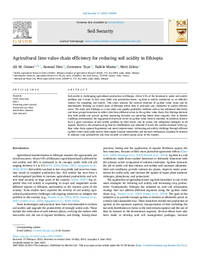Agricultural lime value chain efficiency for reducing soil acidity in Ethiopia

Authors:
Soil acidity is challenging agricultural production in Ethiopia. Above 43% of the farmland is under soil acidity
problem and it leads to low crop yields and production losses. Ag-lime is widely considered as an effective
remedy for amending soil acidity. This study assesses the current structure of ag-lime value chain and its
functionality focusing on central parts of Ethiopia where lime is produced and channeled to acidity affected
areas. The study uses Ethiopia as a case study and applies qualitative methods such as key informant interviews and focus group discussions to collect data from different actors in the ag-lime value chain. Key findings indicate that both public and private ag-lime producing factories are operating below their capacity. Due to limited enabling environments, the engagement of private sector in ag-lime value chain is minimal. In addition, farmers have a good awareness of soil acidity problem on their farms, and its causes and mitigation strategies in all regions. However, the adoption of ag-lime by smallholders was minimal. Overall, the current structure of the aglime value chain appears fragmented and needs improvement. Addressing soil acidity challenge through efficient ag-lime value chain could narrow lime supply-demand mismatches and increase widespread adoption by farmers to enhance crop productivity and food security in acidity-prone areas of the country.
